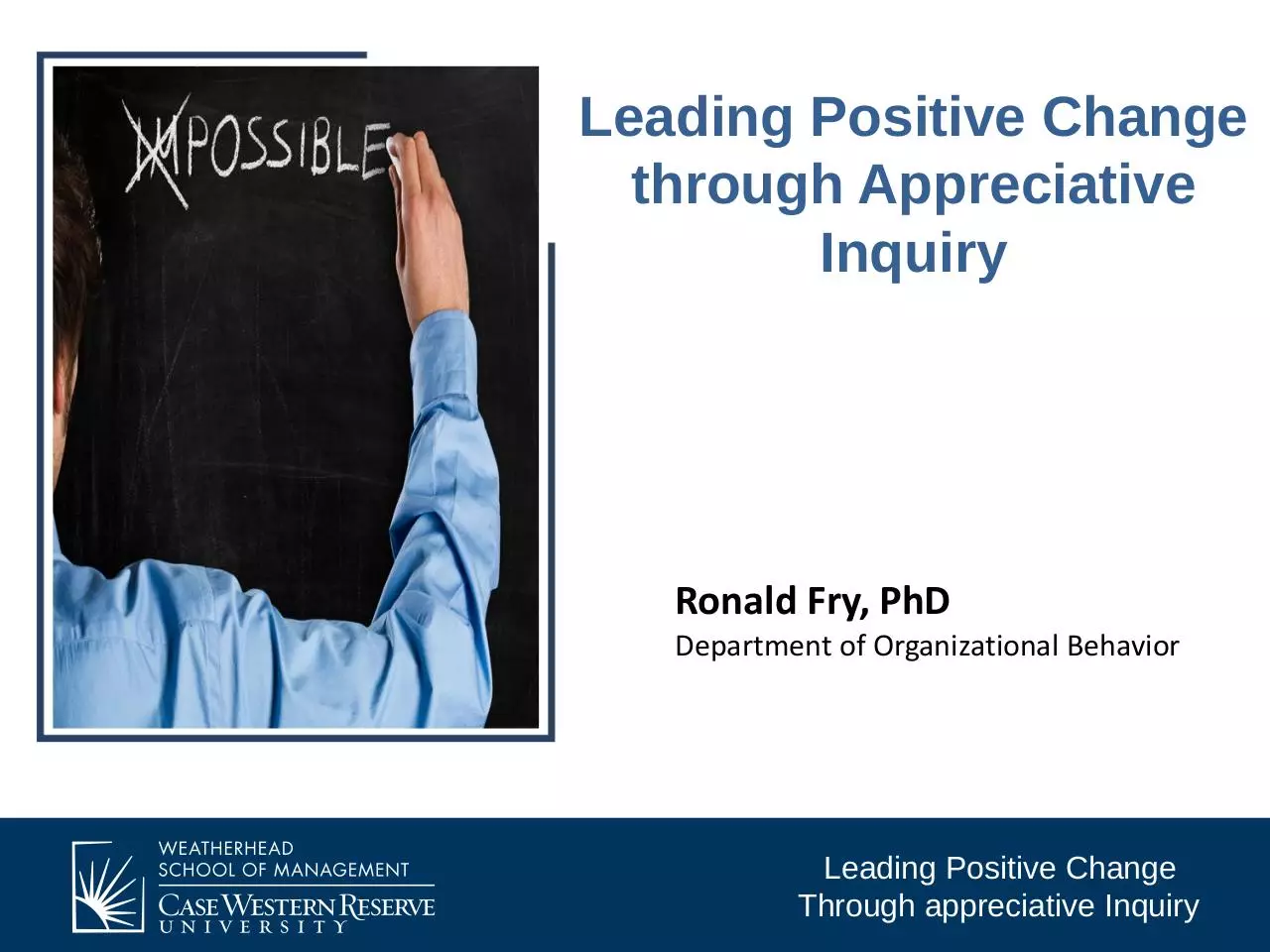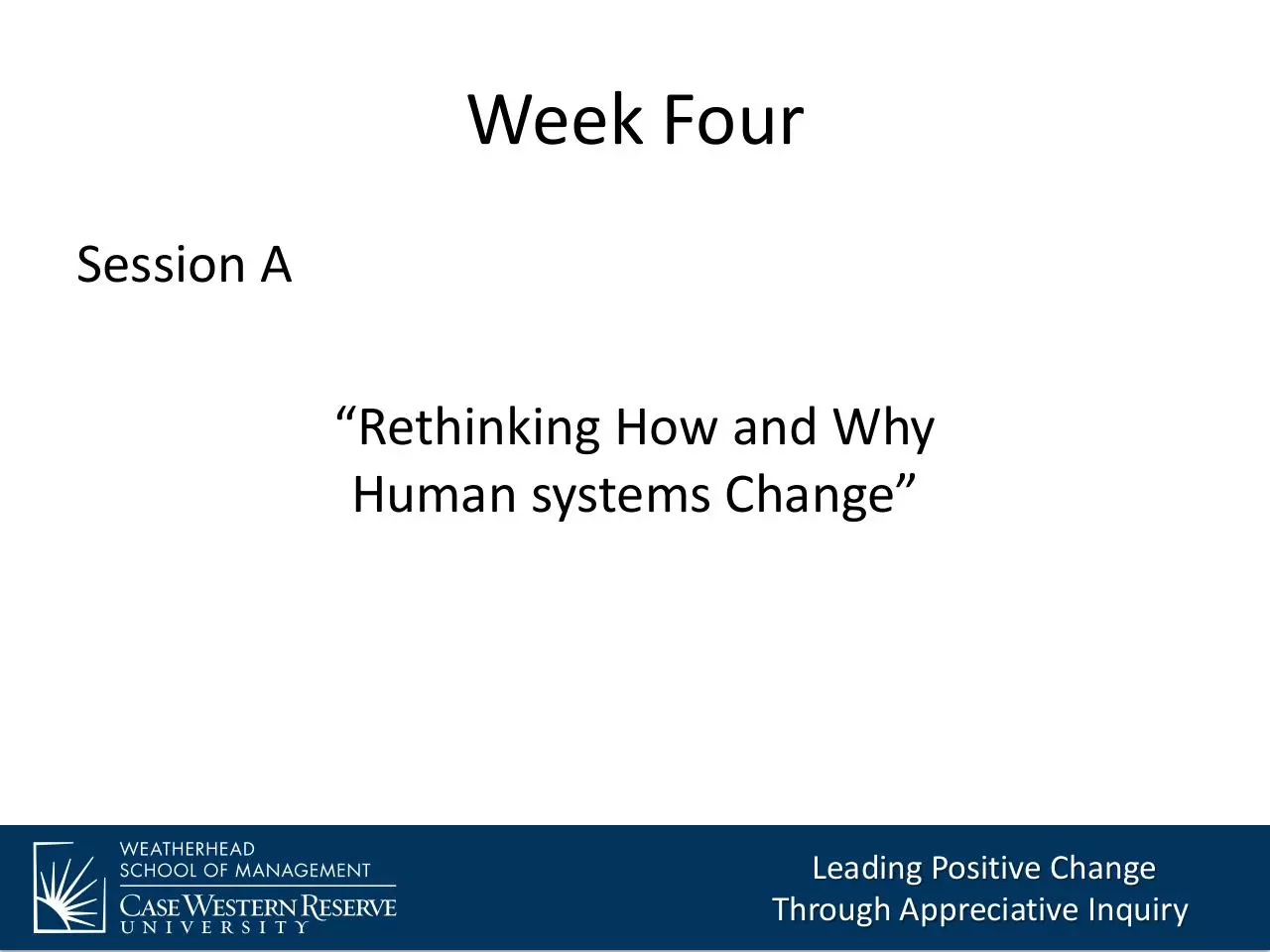MOOC slides Fry Weeks 4 6 (PDF)
File information
Title: Slide 1
Author: Patricia Schellenbach
This PDF 1.5 document has been generated by Acrobat PDFMaker 15 for PowerPoint / Adobe PDF Library 15.0, and has been sent on pdf-archive.com on 02/01/2018 at 18:02, from IP address 99.76.x.x.
The current document download page has been viewed 504 times.
File size: 3.01 MB (64 pages).
Privacy: public file





File preview
Insert Course Icon
Image here
Leading Positive Change
through Appreciative
Inquiry
Ronald Fry, PhD
Department of Organizational Behavior
LeadingPositive
PositiveChange
Change
Leading
Through
appreciativeInquiry
Inquiry
Through
Appreciative
Week Four
Session A
“Rethinking How and Why
Human systems Change”
Leading Positive Change
Through Appreciative Inquiry
Principles of “AI”
• Constructionist Principle
Our questions are fateful: Change
begins with the first questions we
ask;
• Principle of Simultaneity
• Open Book “Poetic Principle”
• Anticipatory Principle
• Positive Principle
• Narrative Principle
Words Create Worlds: We move
in the direction of what we most
interact about
Whatever we study…will GROW:
We can study anything in any
human system
Fundamental change comes from changing
the Images of the Future
Positive Images Positive Actions
Stories unite across boundaries; generations
Leading Positive Change
Through Appreciative Inquiry3
Many
Disciplines
The New Model
of Strengthbased Change
• Positive Anticipatory Images — research on positive
health, placebo effect
• Positive perception — pygmalion research
• Language and words — inner/outer dialogue research
• Positive emotions — hope, inspiration, joy
• Power of stories — studies on rise and fall of cultures
• Positive relationships — high quality connections
Leading Positive Change
Through Appreciative Inquiry
Positive Image Positive Action
PLACEBO EFFECT
PYGMALION EFFECT
Leading Positive Change
Through Appreciative Inquiry5
2:1 Imbalance in favor
of Positive Images
for Health and Well-being
“No, not Trees!”
Leading Positive Change
Through Appreciative Inquiry6
Research on High Performing
Business Teams
HIGH PERFORMING
6:1 ratio of positive– (strengthbased and opportunity)
focused dialogue to negative
(deficiency focus) dialogue.
1:1 balance of inquiry (learning
focused questions) versus
advocacy (closed positions)
type conversation.
Losada & Heaphy (2005)
LOW PERFOMING
1:3 ratio: one positive statement
in the team for every three
deficiency focused
statements.
1:20 ratio: one inquiry (openlearning type questions) for
every twenty remarks based
on advocacy.
Leading Positive Change
Through Appreciative Inquiry
The “Imbalance Ratio Effect” Example 2: Co-Elevation
Ratios in 10 Organization Change Programs Linda Robson, 2015
High
Performers
Moderate
Performers
Low
Performers
4
3
3
All Data Combined
4:1
2:1
1:1
Interview Data
3:1
1:1
1:1
Group Meeting Data
2:1
1:1
1:4
Website Data
26:1
28:1
12:1
Number of
Programs
Leading Positive Change
Through Appreciative Inquiry
Our studies show that to Succeed as a
Positive Change Leader, you need 3 things:
1. A Guiding Change Platform to provide a shared roadmap
2. You need to excel in the Management of Continuity
3. You need tools and methods to create at least a
4:1 Ratio of Hope and Inspiration vs. Despair and Deficit
Leading Positive Change
Through Appreciative Inquiry
Download MOOC slides - Fry - Weeks 4-6
MOOC slides - Fry - Weeks 4-6.pdf (PDF, 3.01 MB)
Download PDF
Share this file on social networks
Link to this page
Permanent link
Use the permanent link to the download page to share your document on Facebook, Twitter, LinkedIn, or directly with a contact by e-Mail, Messenger, Whatsapp, Line..
Short link
Use the short link to share your document on Twitter or by text message (SMS)
HTML Code
Copy the following HTML code to share your document on a Website or Blog
QR Code to this page

This file has been shared publicly by a user of PDF Archive.
Document ID: 0000715903.